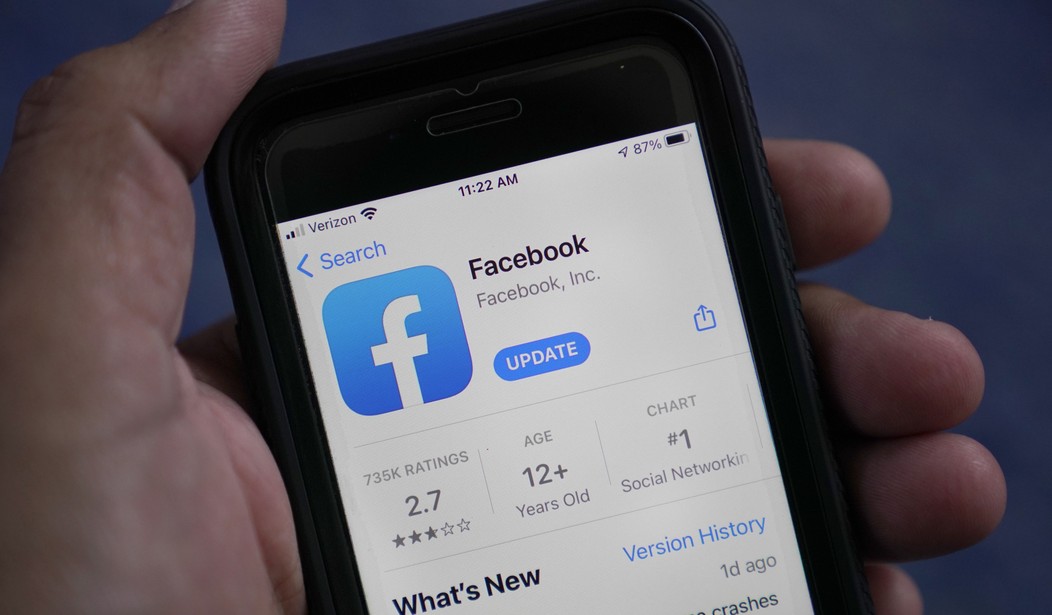The impact of Monday’s internet outage spread a lot further than just Facebook, Instagram and WhatsApp. Amazon, Amazon Web Services, Google, Google Fiber and CloudFlare; Verizon,AT&T, T-Mobile, Xfinity, Peacock, US Cellular, Cricket, Cox; Snapchat, Zoom and TikTok: These companies are among those who received massive upticks in complaints of non-working services from users frustrated with their inability to access either Facebook companies themselves, or Facebook services integrated into their sites.
Facebook says “the root cause of this outage was a faulty configuration change,” detailing the expensive disaster in a Tuesday post, but don’t get distracted: The ripple effect of this “faulty configuration change” was great enough to disrupt unrelated business around the entire planet -- and exposed the implications Big Tech failings can have on our country and its economy.
Reports of disruptions lasted hours, and taken together, give the American people a glancing peek at the raw dominion and sheer influence that a handful of megacorporations have over the various aspects of our everyday lives. Because of a “glitch,” major communication closed down, aspects of commerce and related transactions ceased, and people all over America were left wondering when the systems they use every day would be restored.
Monday’s internet outage provides a glimpse into just how much power a few companies wield; and just how vulnerable the internet -- and with it our entire economy -- are to the effects of a major player going down, be it by accident or subterfuge. A good number of these same few companies hold that same power over Americans’ political freedoms; and a large portion of those -- including Amazon Web Services, Facebook, Twitter and Google -- have shown open hostility toward those same freedoms.
Power appropriately checked can be benevolent. Big Tech’s power, however, is far from checked: Commerce and communications can literally end—either inadvertently or deliberately—in a moment; fundamental liberties can be arbitrarily extinguished by “community guidelines” or other subjective content moderation policies; and political agendas can be selectively advanced and ideological opponents, selectively punished.
Recommended
Big Tech got here by trampling on free-enterprise and innovation, and, to be sure, by exploiting regulation to block out competition and shield itself against reform. It’s not entirely different today than yesteryear, when Big Oil, Big Steel, and Big Railroads had the power to exert long-unchecked influence within America’s democratic institutions.
Our elected representatives need to protect Americans from the abusive practices of monopolistic enterprises. Take, for example, Amazon, which started humbly enough as an online bookstore. Today, it controls not only the majority of online e-book and print sales, but is expected to seize 50 percent of America’s e-commerce trade this year. Amazon’s nearly ubiquitous service has changed the retail landscape with broad and unquestioned public acceptance. Through investing in cloud computing, it has aggregated web-hosting, which now, through Amazon Web Services, are responsible for over $13.5 billion each year – over half their annual revenue.
Other companies like Google and Apple followed this same pattern of mass acquisitions in their respective markets with little to no resistance from Congress and the antitrust regulators of the executive branch agencies. This dominance is a cause for tremendous concern.
Americans cannot allow Congress to overlook this unchecked power, the danger it poses. Our solutions have always been found in unfettered debate and domestic economic policies that restrains unfair trade practices, support innovation and competition, and protect intellectual property.
Rather than helplessly relying on monopolistic megacorporations, we need to become active agents—determiners of our own destinies—by building alternative structures. Only then, when we once more have actual choices, will we be able to protect ourselves, our Constitution, and our country.
Christopher Bedford is Chief Communications Officer at RightForge, a full-service technology infrastructure company.

























Join the conversation as a VIP Member